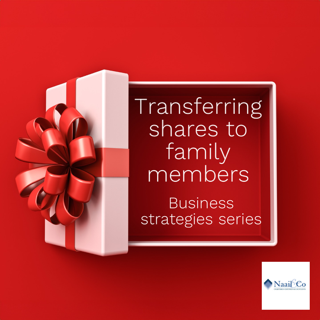Transferring shares to family members
(Business strategies series)
Introduction
The transfer of shares can occur for a variety of reasons, typically when the owner opts for retirement or seeks to lessen their engagement in the business. Conversely, parents might desire their children to possess a portion of the company’s shares to receive dividends, potentially aiding in financing further education. Such transfers may take place through gifting or selling shares, or the company may opt to issue new shares to family members, thereby diminishing the percentage ownership of other shareholders.
Valuation of the gift
However, invariably, the transfer will constitute a gift. The taxation implications will vary depending on the recipient of the shares. Transfers to a spouse or civil partner enjoy tax-free status, as asset transfers between married couples and civil partners are exempt from taxation. From a capital gains tax (CGT) standpoint, such gifts are deemed to occur at ‘no gain/no loss’ and are also exempt from inheritance tax (IHT).
Conversely, transfers of shares between family members outside of marriage or civil partnerships incur charges. In such cases, the transferor assumes liability based on the open market value of the shares at the time of gifting.
Determining the market value can be intricate, as legislation stipulates a hypothetical transaction involving a willing buyer and seller to ascertain the appropriate price. Valuing shares in a private company is inherently complex, with no universally accepted valuation method. However, with a comprehensive understanding of the company and its market, a valuation expert can assist in arriving at a reasonable estimate. We, at Naail & Co, provide business valuation service. Please get in touch for shares and/or business valuation.
Capital or income?
Transferring shares through gifting entails a non-monetary exchange, resulting in no immediate cash flow to cover potential Capital Gains Tax (CGT) obligations. However, it is possible to defer the gain by invoking ‘gift relief,’ effectively deferring the tax liability to the recipient upon eventual sale of the shares. Sale of shares is subject to standard conditions, including the ownership of at least 5% of shares and voting rights in the company, with the company’s primary activities classified as ‘trading.’
Transferring shares during the owner’s lifetime may trigger scrutiny under anti-avoidance rules concerning ‘settlements.’ Nonetheless, such transfers to family members are generally exempt, provided that dividend income rights remain unrestricted.
The transfer may trigger Inheritance Tax (IHT) implications if the donor passes away within seven years of the gift. Should the value of the estate, inclusive of the gifted shares, surpass the IHT threshold, a tax liability may arise. However, various exemptions and reliefs, such as the annual gift exemption and business property relief, can mitigate the tax burden.
Given that no consideration is exchanged for the shares, there are no stamp duty implications.
Potential issues may arise if the family member receiving the shares is an employee of the company at the time of transfer. HM Revenue & Customs (HMRC) may contend that the shares were granted due to the individual’s employment status, potentially resulting in the classification of the gift as employment income under the ’employment-related securities’ provisions or, in certain cases, under the ‘disguised remuneration’ rules.
Practical tip
In situations where the evidence is ambiguous, it may be prudent to explore the option of submitting a non-statutory clearance application to HM Revenue & Customs (HMRC). This application would outline the facts and rationale behind the transfer of shares to family members. Typically, if shares are solely transferred to children engaged in the business, HMRC is likely to acknowledge that the transfer aligns with the ordinary dynamics of domestic, family, or personal relationships, rather than constituting employment income. Get in touch with Naail & Co for relevant advice around transferring shares to your family members.

Our service to you
If you are a self employed, business owner/director of company looking to get your accountancy and taxation matters sorted, look no further. We, at Naail & Co, are pro-active and easily accessible accountants and tax advisors, who will not only ensure that all your filing obligations are up to date with Companies House and HMRC, but also you do not pay a penny more in taxes than you have to. We work on a fixed fee basis and provide same day response to all your phone and email enquiries. We will also allocate a designated accounts manager who would have better understanding of your and business financial and taxation affairs. Book a free consultation call using the link below.
Related pages:
Get further information from the following pages;
Related Blogs:
Get further information from the following blogs;
Things to do before 5th April 2024
Tax tips: Must be actioned before end of financial year
Inheritance tax planning for main residence
Inheritance tax: Gifts for maintenance of family
Subscribe to our newsletter
BUSINESS HOURS
Monday – Friday
- 9:00 am – 5:30 pm
Pages:
Menu








